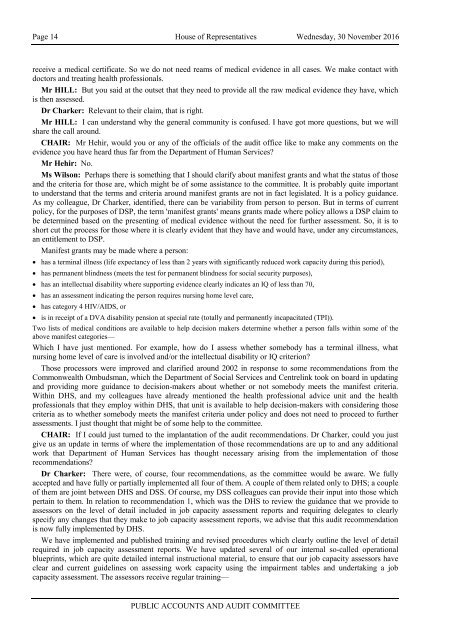Proof Committee Hansard
2hbqb7M
2hbqb7M
You also want an ePaper? Increase the reach of your titles
YUMPU automatically turns print PDFs into web optimized ePapers that Google loves.
Page 14 House of Representatives Wednesday, 30 November 2016<br />
receive a medical certificate. So we do not need reams of medical evidence in all cases. We make contact with<br />
doctors and treating health professionals.<br />
Mr HILL: But you said at the outset that they need to provide all the raw medical evidence they have, which<br />
is then assessed.<br />
Dr Charker: Relevant to their claim, that is right.<br />
Mr HILL: I can understand why the general community is confused. I have got more questions, but we will<br />
share the call around.<br />
CHAIR: Mr Hehir, would you or any of the officials of the audit office like to make any comments on the<br />
evidence you have heard thus far from the Department of Human Services?<br />
Mr Hehir: No.<br />
Ms Wilson: Perhaps there is something that I should clarify about manifest grants and what the status of those<br />
and the criteria for those are, which might be of some assistance to the committee. It is probably quite important<br />
to understand that the terms and criteria around manifest grants are not in fact legislated. It is a policy guidance.<br />
As my colleague, Dr Charker, identified, there can be variability from person to person. But in terms of current<br />
policy, for the purposes of DSP, the term 'manifest grants' means grants made where policy allows a DSP claim to<br />
be determined based on the presenting of medical evidence without the need for further assessment. So, it is to<br />
short cut the process for those where it is clearly evident that they have and would have, under any circumstances,<br />
an entitlement to DSP.<br />
Manifest grants may be made where a person:<br />
has a terminal illness (life expectancy of less than 2 years with significantly reduced work capacity during this period),<br />
has permanent blindness (meets the test for permanent blindness for social security purposes),<br />
has an intellectual disability where supporting evidence clearly indicates an IQ of less than 70,<br />
has an assessment indicating the person requires nursing home level care,<br />
has category 4 HIV/AIDS, or<br />
is in receipt of a DVA disability pension at special rate (totally and permanently incapacitated (TPI)).<br />
Two lists of medical conditions are available to help decision makers determine whether a person falls within some of the<br />
above manifest categories—<br />
Which I have just mentioned. For example, how do I assess whether somebody has a terminal illness, what<br />
nursing home level of care is involved and/or the intellectual disability or IQ criterion?<br />
Those processors were improved and clarified around 2002 in response to some recommendations from the<br />
Commonwealth Ombudsman, which the Department of Social Services and Centrelink took on board in updating<br />
and providing more guidance to decision-makers about whether or not somebody meets the manifest criteria.<br />
Within DHS, and my colleagues have already mentioned the health professional advice unit and the health<br />
professionals that they employ within DHS, that unit is available to help decision-makers with considering those<br />
criteria as to whether somebody meets the manifest criteria under policy and does not need to proceed to further<br />
assessments. I just thought that might be of some help to the committee.<br />
CHAIR: If I could just turned to the implantation of the audit recommendations. Dr Charker, could you just<br />
give us an update in terms of where the implementation of those recommendations are up to and any additional<br />
work that Department of Human Services has thought necessary arising from the implementation of those<br />
recommendations?<br />
Dr Charker: There were, of course, four recommendations, as the committee would be aware. We fully<br />
accepted and have fully or partially implemented all four of them. A couple of them related only to DHS; a couple<br />
of them are joint between DHS and DSS. Of course, my DSS colleagues can provide their input into those which<br />
pertain to them. In relation to recommendation 1, which was the DHS to review the guidance that we provide to<br />
assessors on the level of detail included in job capacity assessment reports and requiring delegates to clearly<br />
specify any changes that they make to job capacity assessment reports, we advise that this audit recommendation<br />
is now fully implemented by DHS.<br />
We have implemented and published training and revised procedures which clearly outline the level of detail<br />
required in job capacity assessment reports. We have updated several of our internal so-called operational<br />
blueprints, which are quite detailed internal instructional material, to ensure that our job capacity assessors have<br />
clear and current guidelines on assessing work capacity using the impairment tables and undertaking a job<br />
capacity assessment. The assessors receive regular training—<br />
PUBLIC ACCOUNTS AND AUDIT COMMITTEE















